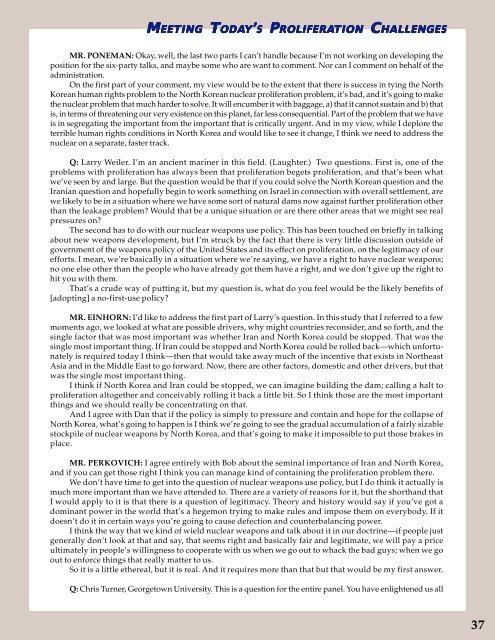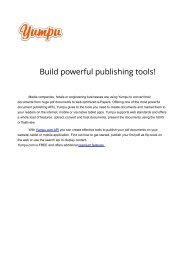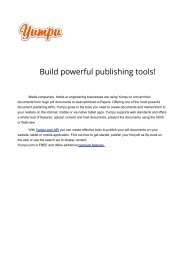test_pdf.pdf
Create successful ePaper yourself
Turn your PDF publications into a flip-book with our unique Google optimized e-Paper software.
MEETING<br />
TODA<br />
ODAY’S PROLIFERA<br />
ROLIFERATION<br />
CHALLENGES<br />
MR. PONEMAN: Okay, well, the last two parts I can’t handle because I’m not working on developing the<br />
position for the six-party talks, and maybe some who are want to comment. Nor can I comment on behalf of the<br />
administration.<br />
On the first part of your comment, my view would be to the extent that there is success in tying the North<br />
Korean human rights problem to the North Korean nuclear proliferation problem, it’s bad, and it’s going to make<br />
the nuclear problem that much harder to solve. It will encumber it with baggage, a) that it cannot sustain and b) that<br />
is, in terms of threatening our very existence on this planet, far less consequential. Part of the problem that we have<br />
is in segregating the important from the important that is critically urgent. And in my view, while I deplore the<br />
terrible human rights conditions in North Korea and would like to see it change, I think we need to address the<br />
nuclear on a separate, faster track.<br />
Q: Larry Weiler. I’m an ancient mariner in this field. (Laughter.) Two questions. First is, one of the<br />
problems with proliferation has always been that proliferation begets proliferation, and that’s been what<br />
we’ve seen by and large. But the question would be that if you could solve the North Korean question and the<br />
Iranian question and hopefully begin to work something on Israel in connection with overall settlement, are<br />
we likely to be in a situation where we have some sort of natural dams now against further proliferation other<br />
than the leakage problem? Would that be a unique situation or are there other areas that we might see real<br />
pressures on?<br />
The second has to do with our nuclear weapons use policy. This has been touched on briefly in talking<br />
about new weapons development, but I’m struck by the fact that there is very little discussion outside of<br />
government of the weapons policy of the United States and its effect on proliferation, on the legitimacy of our<br />
efforts. I mean, we’re basically in a situation where we’re saying, we have a right to have nuclear weapons;<br />
no one else other than the people who have already got them have a right, and we don’t give up the right to<br />
hit you with them.<br />
That’s a crude way of putting it, but my question is, what do you feel would be the likely benefits of<br />
[adopting] a no-first-use policy?<br />
MR. EINHORN: I’d like to address the first part of Larry’s question. In this study that I referred to a few<br />
moments ago, we looked at what are possible drivers, why might countries reconsider, and so forth, and the<br />
single factor that was most important was whether Iran and North Korea could be stopped. That was the<br />
single most important thing. If Iran could be stopped and North Korea could be rolled back—which unfortunately<br />
is required today I think—then that would take away much of the incentive that exists in Northeast<br />
Asia and in the Middle East to go forward. Now, there are other factors, domestic and other drivers, but that<br />
was the single most important thing.<br />
I think if North Korea and Iran could be stopped, we can imagine building the dam; calling a halt to<br />
proliferation altogether and conceivably rolling it back a little bit. So I think those are the most important<br />
things and we should really be concentrating on that.<br />
And I agree with Dan that if the policy is simply to pressure and contain and hope for the collapse of<br />
North Korea, what’s going to happen is I think we’re going to see the gradual accumulation of a fairly sizable<br />
stockpile of nuclear weapons by North Korea, and that’s going to make it impossible to put those brakes in<br />
place.<br />
MR. PERKOVICH: I agree entirely with Bob about the seminal importance of Iran and North Korea,<br />
and if you can get those right I think you can manage kind of containing the proliferation problem there.<br />
We don’t have time to get into the question of nuclear weapons use policy, but I do think it actually is<br />
much more important than we have attended to. There are a variety of reasons for it, but the shorthand that<br />
I would apply to it is that there is a question of legitimacy. Theory and history would say if you’ve got a<br />
dominant power in the world that’s a hegemon trying to make rules and impose them on everybody. If it<br />
doesn’t do it in certain ways you’re going to cause defection and counterbalancing power.<br />
I think the way that we kind of wield nuclear weapons and talk about it in our doctrine—if people just<br />
generally don’t look at that and say, that seems right and basically fair and legitimate, we will pay a price<br />
ultimately in people’s willingness to cooperate with us when we go out to whack the bad guys; when we go<br />
out to enforce things that really matter to us.<br />
So it is a little ethereal, but it is real. And it requires more than that but that would be my first answer.<br />
Q: Chris Turner, Georgetown University. This is a question for the entire panel. You have enlightened us all<br />
37<br />
37
















